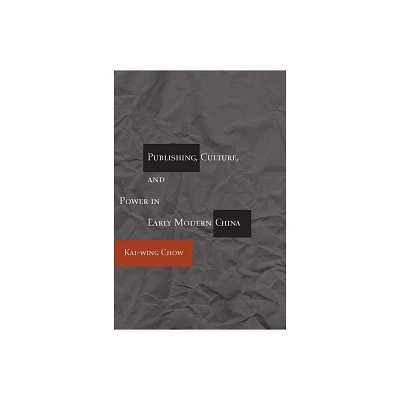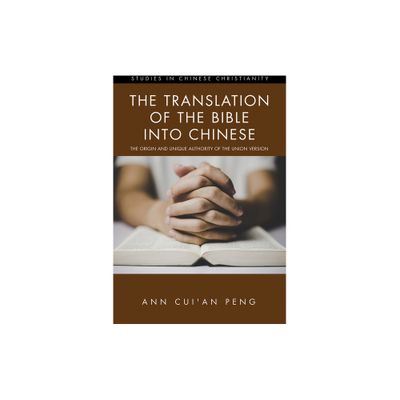Home
Poetics and Prosody in Early Mediaeval China: A Study and Translation of Ku?kai's ?? Bunkyo? Hifuron ?????
Loading Inventory...
Barnes and Noble
Poetics and Prosody in Early Mediaeval China: A Study and Translation of Ku?kai's ?? Bunkyo? Hifuron ?????
Current price: $72.95


Barnes and Noble
Poetics and Prosody in Early Mediaeval China: A Study and Translation of Ku?kai's ?? Bunkyo? Hifuron ?????
Current price: $72.95
Loading Inventory...
Size: OS
*Product Information may vary - to confirm product availability, pricing, and additional information please contact Barnes and Noble
Bodman's study and translation of the
Bunkyō hifuron
is a carefully revised edition of his 1978 Ph.D. thesis at Cornell University. Never previously published, this Quirin Press Edition offers the following features:
-Older Wade-Giles transliteration fully updated and revised to Pinyin. - Carefully typeset and proofed for typographical errors and inconsistencies. - Index & bibliography. - Fully revised and updated by the author.
Keywords: Poetics. Chinese language -- Versification. Asian philology. Chinese poetry -- History and criticism.
"Compiled in 819 the
文鏡秘府論 (Chinese:
Wenjing mifu lun
) is a unique collection of Chinese writings on poetics and prosody, most of which were lost in China after the Tang dynasty. They owe their preservation to the monk Kūkai 空海 (774-835), founder of the Shingon sect of Buddhism in Japan, who collected some of the earliest discussions of the "four tones and eight faults" of Shen Yue 沈約 (441-513) as well as several important works of literary criticism, chief among which is the
Shige
詩格 of theTang poet Wang Changling 王昌齡 (698-757). It is hence an invaluable source for studying the development of Chinese
shi
詩 poetry from the Six Dynasties to the mid-Tang.
"[The
] was clearly designed to be a systematic and comprehensive introduction to Chinese literature, edited to omit the repetitions and contradictions in the Chinese authorities from which it was compiled. Its six chapter titles form a mandala of the literary universe: The "Heaven" chapter deals with tones and rhymes; "Earth" with models of different styles of writing; "East" and "West" with the problems of composing couplets and avoiding prosodic errors; "South" with literary theory; and "North" with lists of useful phrases and synonyms. Fourteen texts from which the
was compiled have been identified, eleven of which were subsequently lost in China. Kūkai is thus responsible for only a very few sections of the work. His major role was to edit and re-arrange material and to provide suitable headings. While he occasionally inserted a Chinese text intact, he more frequently divided an original work into pieces and scattered them under a number of headings."
Adapted from Richard Bodman's
entry to
The Indiana Companion to Traditional Chinese Literature
, ed. William H. Nienhauser, (Indiana University Press, 1986)
Bodman's present study and translation of the
is a carefully revised edition of his 1978 Ph.D. thesis at Cornell University. Never previously published except for the University Microfilms edition, Poetics and Prosody in Early Mediaeval China has always been and remains the key work of reference in Tang poetics and literary theory.
For further details and extracts visit QuirinPress.com
Bunkyō hifuron
is a carefully revised edition of his 1978 Ph.D. thesis at Cornell University. Never previously published, this Quirin Press Edition offers the following features:
-Older Wade-Giles transliteration fully updated and revised to Pinyin. - Carefully typeset and proofed for typographical errors and inconsistencies. - Index & bibliography. - Fully revised and updated by the author.
Keywords: Poetics. Chinese language -- Versification. Asian philology. Chinese poetry -- History and criticism.
"Compiled in 819 the
文鏡秘府論 (Chinese:
Wenjing mifu lun
) is a unique collection of Chinese writings on poetics and prosody, most of which were lost in China after the Tang dynasty. They owe their preservation to the monk Kūkai 空海 (774-835), founder of the Shingon sect of Buddhism in Japan, who collected some of the earliest discussions of the "four tones and eight faults" of Shen Yue 沈約 (441-513) as well as several important works of literary criticism, chief among which is the
Shige
詩格 of theTang poet Wang Changling 王昌齡 (698-757). It is hence an invaluable source for studying the development of Chinese
shi
詩 poetry from the Six Dynasties to the mid-Tang.
"[The
] was clearly designed to be a systematic and comprehensive introduction to Chinese literature, edited to omit the repetitions and contradictions in the Chinese authorities from which it was compiled. Its six chapter titles form a mandala of the literary universe: The "Heaven" chapter deals with tones and rhymes; "Earth" with models of different styles of writing; "East" and "West" with the problems of composing couplets and avoiding prosodic errors; "South" with literary theory; and "North" with lists of useful phrases and synonyms. Fourteen texts from which the
was compiled have been identified, eleven of which were subsequently lost in China. Kūkai is thus responsible for only a very few sections of the work. His major role was to edit and re-arrange material and to provide suitable headings. While he occasionally inserted a Chinese text intact, he more frequently divided an original work into pieces and scattered them under a number of headings."
Adapted from Richard Bodman's
entry to
The Indiana Companion to Traditional Chinese Literature
, ed. William H. Nienhauser, (Indiana University Press, 1986)
Bodman's present study and translation of the
is a carefully revised edition of his 1978 Ph.D. thesis at Cornell University. Never previously published except for the University Microfilms edition, Poetics and Prosody in Early Mediaeval China has always been and remains the key work of reference in Tang poetics and literary theory.
For further details and extracts visit QuirinPress.com


















